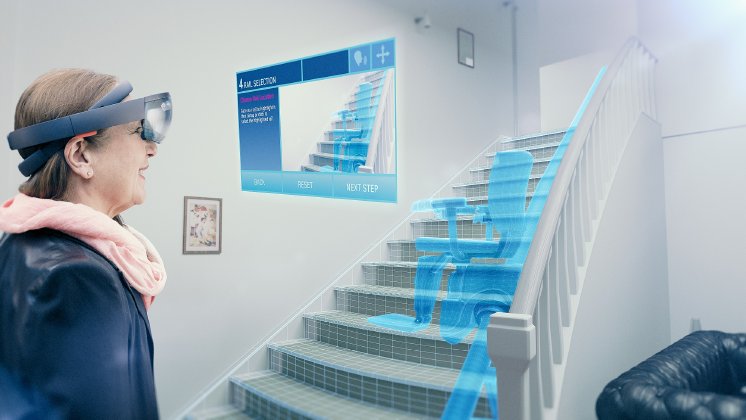- Mixed reality serves as a new and exceptional tool for producing bespoke products; solution to now be rolled out in Germany and other key markets
- Makes it possible to visualize, configure, price and quote a stair lift in real time, reducing the delivery time by up to 4x
- Building on its strong collaboration with Microsoft, thyssenkrupp is leading the digitalization of the urban mobility industry
The demand for such solutions will rise fast: In addition to urban populations growing rapidly, better healthcare and improved standards of living are also enabling people to live longer. The global population is expected to increase from the current 7.4 billion to over 11 billion by 2100 – and is aging. In 2016, every eighth person worldwide was already over 60 years old. For Germany, the Federal Statistical Office calculates that in 2060, 69 percent of the population will be in the pension age. These figures show that the mobility of older people in cities is a growing challenge.
Solutions such as stair lifts are already helping to deliver a better quality of life for the elderly, enabling them to live longer and more independently in their own homes. However, the complexity in designing and delivering home mobility solutions for this demographic is threefold. First, no two staircases are exactly the same and therefore each stair lift needs to be a custom solution specially tailored to individual requirements. Second, today most customers buy these products only when their mobility is already very restricted, making it an emotional experience where they have to accept their new limitations. Third, we live in an age of immediacy and customers want their purchases to be delivered now, meaning that time is of the essence.
It is also clear that the planning for in-home mobility needs to improve. Recent market studied in Germany show that 37 percent of people over the age of 40 would like to remain in their own homes in their old age. However, barely 23 percent of Germans aged between 40 and 49 have thought about this issue. As making our homes comfortable is essential for most of us, the integration of mobility solutions clearly need to be prioritized.
In this regard HoloLens is instrumental to building a perfect customer journey. Staircases can now be measured immediately taking into consideration user ergonomics and obstructions like heating vents, light and electrical fixtures, closeness of the wall, etc. Customers can easily see on a tablet what the chair will look like on their staircase, and make choices with regard to upholstery texture, chair and rail color options, and additional bespoke features to ensure they have a product that fits into the look and feel of their home.
Andreas Schierenbeck, CEO of thyssenkrupp Elevator, commented: “New realities demand new solutions and thyssenkrupp sees HoloLens as an enabler in transforming the customer experience for home solutions and helping to ensure a continued quality of life for ageing populations, regardless of their mobility restrictions.”
thyssenkrupp has already applied this new process in over 100 customer homes in Holland, Spain, and Germany with very positive results and client feedback, and will soon roll out the use of HoloLens in its home solutions throughout Germany.
“IoT and mixed reality technologies are critical success factors for companies that aim to digitally transform their businesses. With the integration of Microsoft HoloLens and home mobility solutions thyssenkrupp is the frontrunner in the industry and shows how to address the challenges of an aging society by using intelligent technologies,” says Sabine Bendiek, Area Vice President Microsoft Germany.
Video: the stairlift-scenario on youtube
Other innovations from thyssenkrupp
Although it is one of the youngest leading companies of the global elevator market, thyssenkrupp has given itself the mission of transforming the industry. Harnessing the power of technology provided by Microsoft has proven to be instrumental in this transformation process, as seen with two major solutions which have already been implemented:
- MAX, the industry’s first IoT and machine learning-enabled predictive maintenance solution. MAX has the potential to cut elevator downtime by up to 50%, thereby maximizing availability and moving the elevator service industry from reactive to predictive mode.
- In its first use of HoloLens, thyssenkrupp introduced these mixed-reality devices into its field operations so that service technicians can visualize and identify problems with elevators ahead of a job, have remote, hands-free access to technical and expert information when on site. Field tests showed that it was possible to complete service interventions up to 4x faster by using HoloLens.
Visit us from April 24-28, 2017 at Hannover Messe in Hall 7, thyssenkrupp / Microsoft booth C40.


